March 16, 2020 report
Ancient ballcourt in Mexico suggests game was played in the highlands earlier than thought
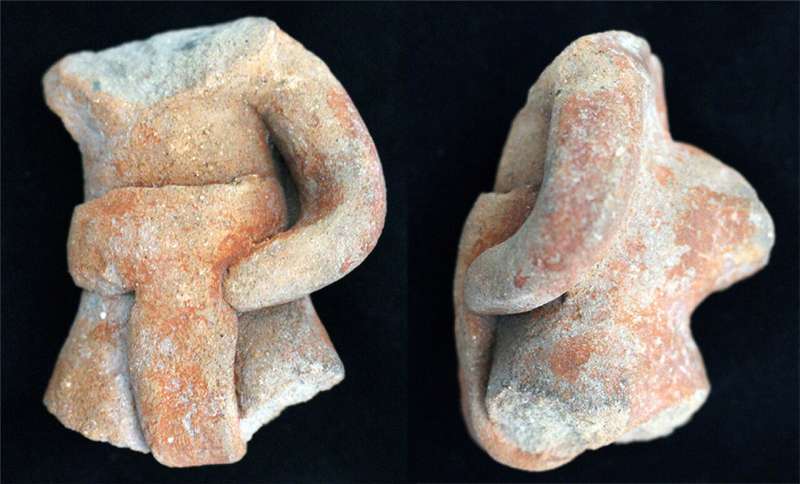
A pair of researchers with George Washington University has found evidence of an ancient ball game played much earlier than previously thought in the Mesoamerican highlands. In their paper published in the journal Science Advances, Jeffrey Blomster and Víctor Salazar Chávez describe the ball court they found and what it means for one of the iconic features of Mesoamerican civilization.
Anthropologists have known for many years that people living in Mesoamerica thousands of years ago played a type of ball game on specially built ball courts. Approximately 2,300 ball courts have been identified to date across a wide swath of what is now Central America and parts of Mexico—some evidence even suggests both Maya and Aztec people played the game. Until now, though, the oldest ball courts found in the highlands suggested play came to such areas long after the game had already evolved to a mature state in the lowlands. In this new effort, the researchers have found a ball court in the highlands that was built much earlier than any other found to date in the highlands, suggesting it was played there much earlier than thought.
The researchers discovered the ball court in the mountains of Oaxaca, in southern Mexico. And the researches have dated it back to approximately 3,400 years ago. Its finding challenges widespread beliefs that the ball game was played exclusively in the lowlands during its formative years. As further evidence of the lowlands as the origin of the sport, the rubber used to make the balls came from Castilla elastica—a species of tree that grows only in the lowlands. The oldest ball court in the lowlands is located in Chiapas, another Mexican state in southern Mexico—it has been dated to approximately 1,560 BC.
-
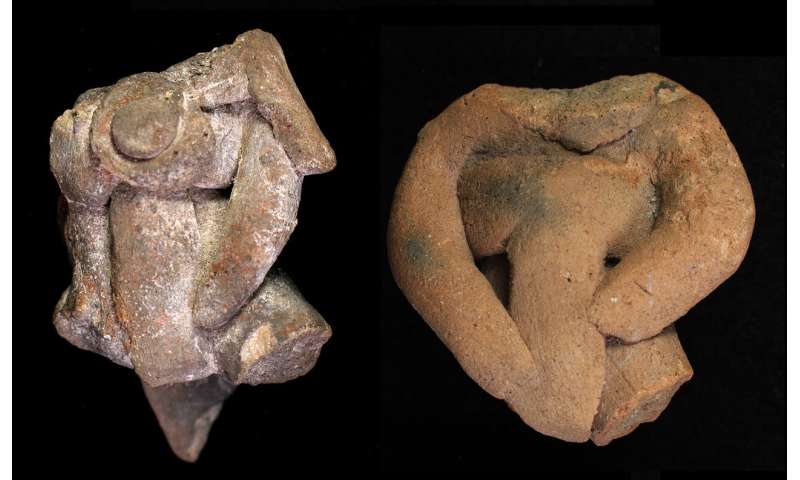
Additional ceramic ballplayer figurines found above the ballcourt. Both wear thick belts or yokes with a loincloth; the figure on the left also has an additional costume element, a collar or pectoral, over the chest. Credit: Formative Etlatongo Project -
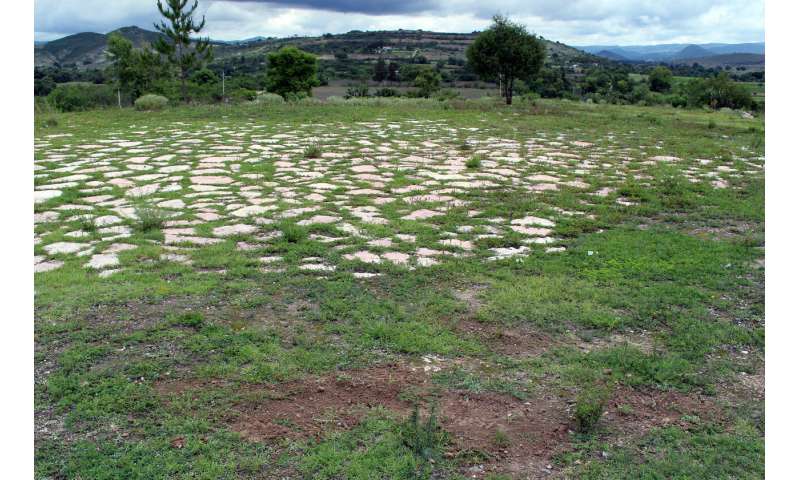
The surface of Mound 1-1 at Etlatongo before excavations began in 2015. Deep below the surface, the project found the ballcourts. Note the old threshing floor on the surface, no longer in use, from the time when these lands belonged to an hacienda. Credit: Formative Etlatongo Project -
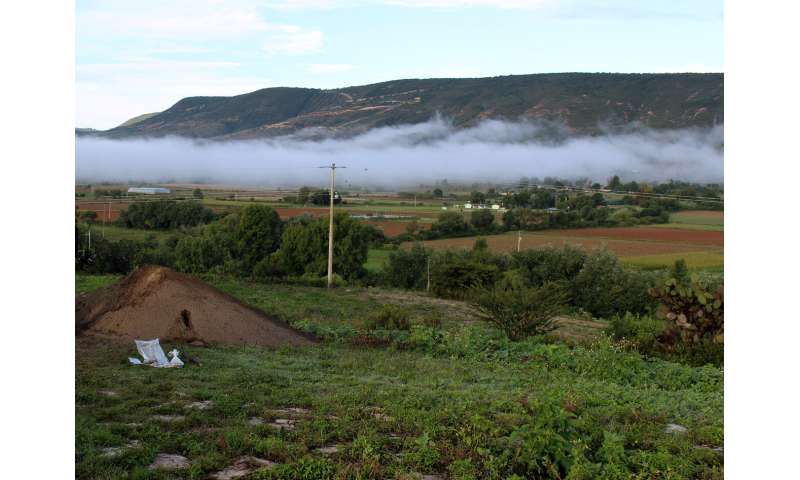
Excavations beginning on Etlatongo Mound 1-1 in the early morning. A small pile of dirt from the excavations has already accumulated on the southern portion of the mound. The modern town of San Mateo Etlatongo is at the foot of the hill in the background of the photo, obscured by the low hanging cloud. Credit: Formative Etlatongo Project -
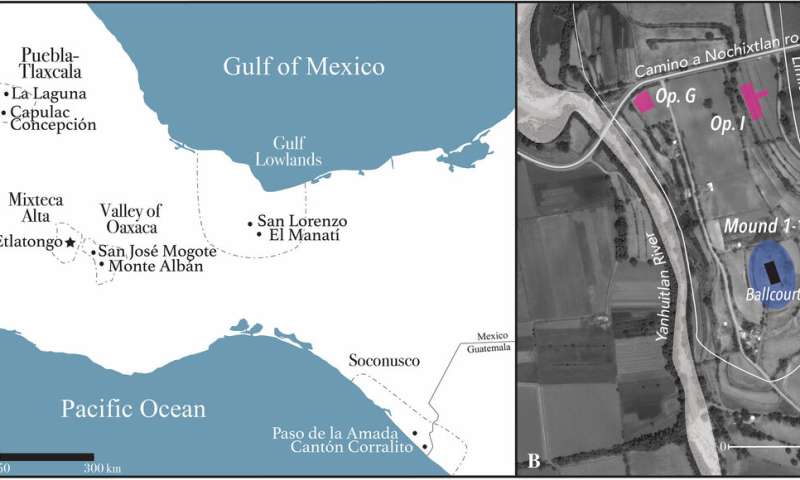
Location of Etlatongo in Mesoamerica and the setting of its ballcourt. (A) Map showing location of Etlatongo in the Mixteca Alta and other referenced sites in Mesoamerica. (B) Aerial view of the ballcourt on Mound 1-1 (colored blue) in relation to domestic space excavated in Operations G & I (purple) to the north. Credit: Blomster and Salazar Chávez, Sci. Adv. 2020; 6 : eaay6964 -
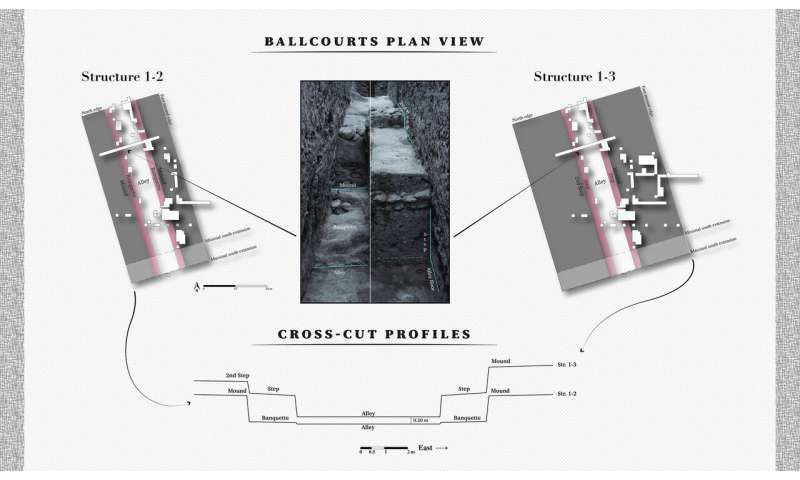
Etlatongo's ballcourts, Structure 1-2 and Structure 1-3, reconstructed plan views and related cross-sections, with separate scales, based on the excavations. Photograph shows architectural details of both ballcourts; the white rectangles over the plan views show excavation locations. Credit: Formative Etlatongo Project -
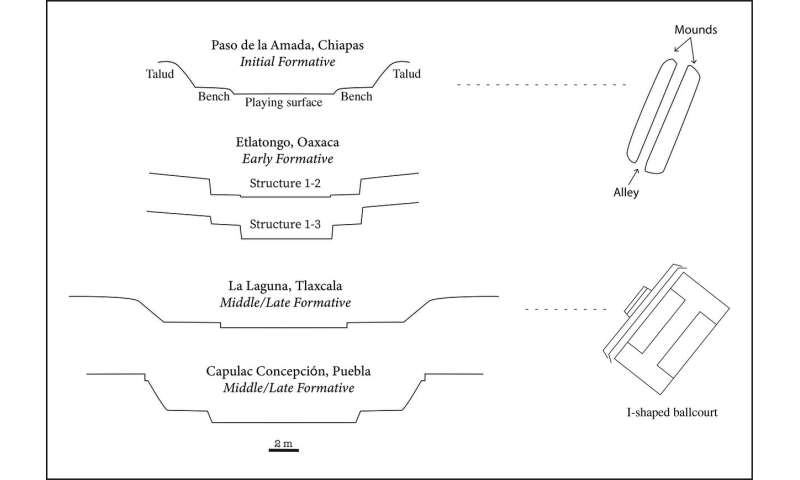
Early ballcourts in Mesoamerica. Comparison of early ballcourt cross-sections (to scale), with earliest on top, with plan views (not to scale) from Paso de la Amada (Chiapas) and La Laguna (Tlaxcala). Credit: Blomster and Salazar Chávez, Sci. Adv. 2020; 6 : eaay6964
The newly discovered ball court was uncovered at the Etlatongo dig site in Oaxaca, where the researchers also uncovered ceramic figurines from the same time period depicting ball players in action. The ball court was found situated beneath another ball court. Early players had evidently retired the earlier court and had covered it over with a new one.
The researchers suggest that the history of the sport will have to be reexamined, noting that it now appears likely that the game evolved with influences from both highlanders and lowlanders. They say more work is required to find additional older ball courts in the highlands.
More information: Jeffrey P. Blomster et al. Origins of the Mesoamerican ballgame: Earliest ballcourt from the highlands found at Etlatongo, Oaxaca, Mexico, Science Advances (2020). DOI: 10.1126/sciadv.aay6964
Journal information: Science Advances
© 2020 Science X Network




















